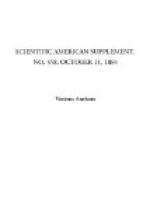However, when the local conditions will permit, it is well to try whether, by means of forced cultivation of the soil, it may not be possible to increase the efficacy of the hydraulic method of procuring immunity from malaria, or of the hydraulico-atmospheric method of “overlaying.” The moment that it is known that this cultivation has frequently been advantageous, there comes forward a crowd of social reasons which induce us to attempt it, even though we be persuaded that we are about to engage in a game of chance. But to dare to attempt it is not all that is necessary; we need also the possibility of so doing, and just here we find ourselves in a vicious circle from which it is not easy to emerge. Forced cultivation cannot be accomplished without the presence of agriculturists in the region during the entire year; and the agriculturists cannot remain in the region during the fever season, for they run thereby too great a risk. For the solution of this question there is but one means: try to increase the power of resistance of the human organism to the attacks of the malaria. It is to a search after the means of accomplishing this result that I have devoted myself during the past few years.
There is nothing to hope for, as regards malaria, in acclimation. Individual acclimation is, and always has been, impossible. The malarial infection is not one of those a first attack of which confers immunity from other attacks. It is, on the contrary, a progressive infection, the duration of which is indeterminate, and which is of such a nature that a single attack may suffice to ruin the constitution for life. Collective or racial acclimation certainly existed in the past, at a time when specific remedies for pernicious malaria were unknown; and even later, when the employment of these remedies was very limited. The acclimation was due to a natural selection made by the malaria upon successive generations, from which it took away, almost without opposition, all those who possessed but a feeble individual power of resistance to the specific poison, while it spared those who possessed this power of resistance in an extraordinary degree. The first were, according to the Grecian myth, the human victims destined to appease the monster or demon who opposed the violation of the territory over which he had up to that time exercised an absolute sovereignty. The second became the founders of the race, and through them, from generation to generation, the collective power of resistance to the malaria was progressively increased. In our own days a like selection may take place among barbarous races, as it does among the cattle and the horses in a malarious region, but it has become an impossibility among civilized nations. By means of the specific remedies which we possess, the use of which is now so general, the lives of a large number of individuals whose resisting powers are very feeble are preserved; and these individuals beget others whose power of resistance to the action of the specific poison is still more feeble. This results after a number of generations in the physical degradation of that part of the human race which inhabits malarious countries.




